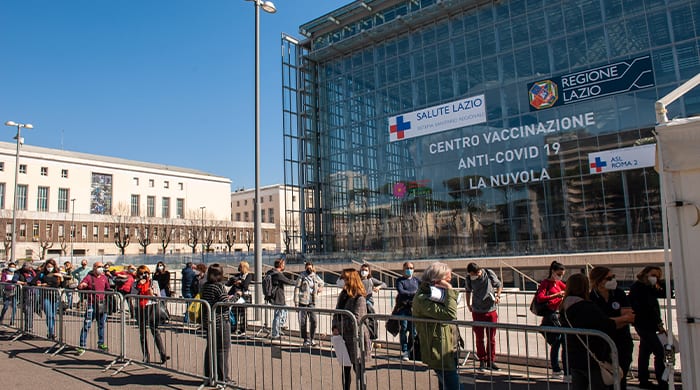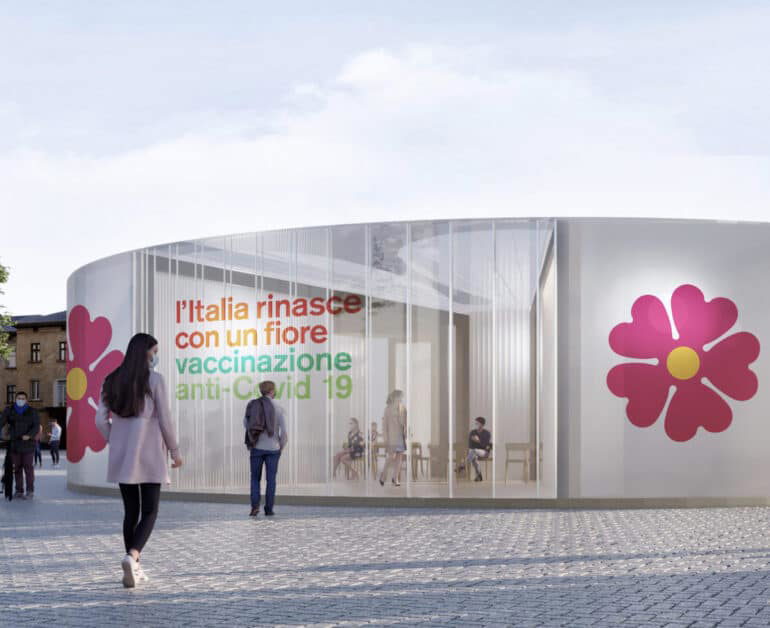Getting a Covid-19 vaccine in Italy
Italy has reserved 215 million doses of covid-19 vaccines. As of May 11, over 28 million doses have been administered and 8.85 million people have been administered the full vaccine. If you want daily up-to-date information, you can check out the report on the number of people getting vaccinated in Italy. Since every Italian region manages its own healthcare system, the administration of the vaccine – from deciding who will receive it to the operations – is managed autonomously by each region. But let’s get into some frequently asked questions regarding the Italian government’s distribution plan of the covid-19 vaccine.
When will I be able to get the covid-19 vaccine in Italy?
Italy’s nationwide vaccination campaign began on December 27th, also dubbed as “Vaccine Day”. The country’s phase one vaccination plan includes initially distributing the vaccine to medical staff, staff and patients of care homes, and elderly citizens ages 80 years and up, counting for a total of 5% of the population. A nurse from the Spallanzani hospital in Rome was the first person to get vaccinated in Italy. But what about the rest of the population?
Once more doses arrive, phase two of the vaccination plan will be in full force and the vaccine will be extended to the rest of the population, prioritizing citizens between 60 and 79 years of age, high-risk teachers and school staff, and people of all ages who suffer from more than one previous chronic disease, immunodeficiency and/or disability. By the end of the second phase, 15% of the population will have been vaccinated. So far, 14% of the population has received both doses of the vaccine.
Phase three of the vaccination plan will vaccinate all other teachers and school staff, people who work in high-risk settings, prison wardens and prisoners, and people with less severe health conditions. By the end of phase three, 50% of the population will have been vaccinated. Phase four will then extend the vaccine to the rest of the population, reaching 90% of the total population to have been vaccinated against covid-19. Of course, how quickly Italy moves from one phase to the next depends on the supply of vaccines. People under 16 years of age are not included in the vaccination plan as clinical trials were only conducted on adults.
Have there been delays in the supply of the covid-19 vaccine?
Unfortunately, during phase one of the vaccination plan Pfizer and AstraZeneca announced there would be delays in the supply of covid-19 vaccines due to production issues. Former Italian Prime Minister Giuseppe Conte accused them of contract violations. In the meantime, the country’s health officials continue to redesign the vaccination program according to the real-time supply. New Prime Minister Mario Draghi has since his investiture been pressuring pharmaceutical houses to deliver the promised doses and more. As of May 11, the vaccination campaign is proceeding smoothly, with an average of 450millions doses administered per day. Starting from May 17, in Lazio, the second dose of Pfizer should be received 35 days after the first to prioritize first doses.
So far, 28 million doses have been supplied on the national territory, with more to come soon.
Is it mandatory to get vaccinated?
According to article 32 of the Italian constitution, no one can be obligated to get a specific medical treatment, unless it’s through the provision of law. For the time being, getting vaccinated against covid-19 in Italy is optional and the government doesn’t intend on making the vaccination compulsory. During the vaccination campaign, which will be free of charge and guaranteed to all citizens, the participation rate will be assessed. However, this doesn’t mean that certain countries, airlines and tourism facilities will not require people to have been vaccinated. There are talks in the air about introducing a “health passport” or a digital international certificate.
How many vaccine doses are needed to become immune to covid-19?
The number of doses required to become immune to covid-19 depends on the vaccine. Most vaccine producers require two doses. The Pfizer-BioNtech vaccine requires the second dose to be administered after 21 days from the first one, while the Moderna vaccine requires the second dose to be administered 28 days from the first one. Both of these have now moved the second shot to after 42 days. Ninety-five percent of the time, after one week from the second dose, patients become immune to covid-19 with Pfizer-BioNtech, and 94.5% of the time with Moderna. This, however, does not mean you won’t be required to wear a mask or maintain social distancing and observe all other restrictions.
How long will immunity last after getting a coronavirus vaccine?
The duration of the immunity to covid-19 is still not certain after getting a vaccine. This is because the observation period was very short. However, it is predicted that immunity will last around nine to twelve months.
Which types of covid-19 vaccines are being administered in Italy?
Italy is currently administering four vaccines: the one from Pfizer-BioNtech (which was the first covid-19 vaccine to be authorized in Europe), the one from Moderna (authorized on January 7th), the one from AstraZeneca (authorized on January 29), and the one from Johnson&Johnson (authorized on March 11).
How is Italy’s covid-19 vaccine rollout going?
A total of 8.561.000+ people have been administered the full vaccine in Italy, ranking as the 9th most efficient country in the world with 28 million doses administered (updated on 11 May). In the EU, Italy ranks as the 3rd most efficient country, after Germany and France.
What documents do I need to get vaccinated?
A valid identity document and health card (tessera sanitaria) are required. It may be useful to show any health documentation helping the vaccinating healthcare professional to assess the person’s physical condition.
Where do I get vaccinated in Italy?
Vaccines are administered by healthcare professionals in one of the 2.527 public vaccination hubs in Italy. It is currently not possible to get vaccinated against covid-19 privately. In Latium, you can download the SaluteLazio app to book your vaccine or visit salutelazio.it. From May 17, people over 40 will be able to get their covid vaccine through their general practitioner/medico di base with an Astrazeneca or Johnson&Johnson dose.

Where do I get vaccinated in Rome?
There are 16 hubs in Rome, and more in Lazio. The main ones are: Nuvola di Fuksas (Centro Congressi EUR), the biggest hub in the country, Auditorium Parco della Musica, Cinecittà Studios, and Termini Station.
In July, Latium will inaugurate 8 new hubs where everyone can get vaccinated, no matter their age, so that younger people can access the vaccine in summer. The vaccine will be reservable on the SaluteLazio app.
When can I find out about the next vaccine open days?
The Lazio region is organizing many open house days during the weekend where many people can get vaccinated. We suggest checking SaluteLazio regularly.
Can non-Italian citizens get vaccinated in Italy?
According to the priority scheme defined in the Vaccination Plan, all people will be vaccinated who are present on the Italian territory, residents with or without a residence permit pursuant to Article 35 of Consolidated Law on Immigration.
Can pregnant or breastfeeding women get vaccinated?
Data is still very limited but lab studies on animal models have not shown harmful effects for the Moderna vaccine. The vaccines are not contraindicated and do not exclude a priori pregnant women from vaccination. As for breastfeeding, despite the lack of specific studies, there is no biologically plausible risk preventing them from continuing breastfeeding.
Can children get vaccinated?
Vaccines are not currently recommended for children below 16 years (Comirnaty) and 18 years (Moderna, Vaxzevria e Janssen). The European Medicines Agency (EMA) has agreed with the company manufacturing Comirnaty on a plan to trial the vaccine in children at a later stage.







Buon giorno, gentili signori,
Il Ministero della Salute italiano, rappresentato dal Ministro Roberto Speranza, il 13 dicembre 2021, ha annunciato la possibilità di rivaccinare i cittadini stranieri vaccinati con un vaccino non approvato dall’EMA (funzioneranno anche “Sputnik V” o Sinovac). Potranno ricevere una dose di richiamo del vaccino mRNA ai dosaggi consentiti per la dose di “richiamo”,
è possibile fare la vaccinazione di richiamo contro il covid a Verona per gli stranieri?
Veniamo dalla Russia a Verona per gli affari, abbiamo già 2 vaccinazioni Sputnik V (3 mesi fa).
Cordiali saluti, Nina.